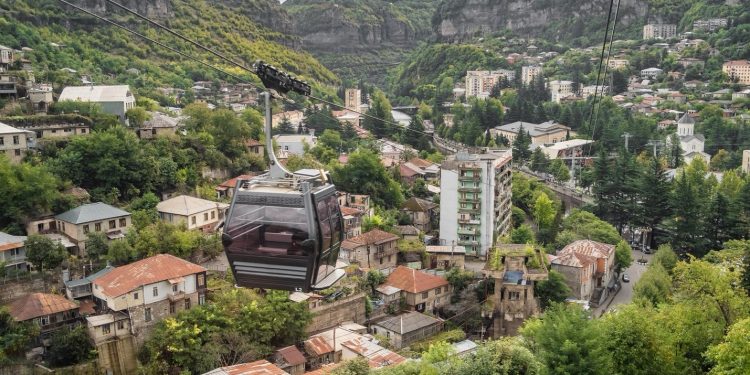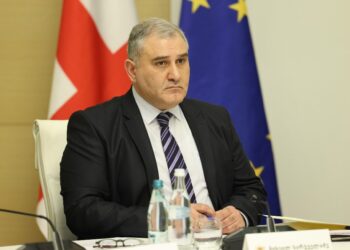Interview by Kesaria Katcharava
As climate change continues to pose significant challenges worldwide, grassroots organizations are emerging as vital players in fostering resilience and promoting environmental stewardship. One such organization, the Mkhardamkhar Association, is making a remarkable impact in the Chiatura municipality of Georgia. Through dedicated efforts to combat soil degradation and raise environmental awareness, Mkhardamkhar is empowering local residents—especially women and youth—to take an active role in environmental decision-making.
The association was established in 2013 with a clear mission: to increase civic activity and develop young people into engaged citizens. This mission is particularly urgent in Chiatura, where unsystematic mineral extraction, particularly manganese, has led to severe environmental degradation, including soil depletion, increased CO2 emissions, deforestation, and water pollution. Recognizing these challenges, Mkhardamkhar focused on targeted projects aimed at restoring degraded soils and mitigating climate change effects.
In their recent initiative, , the association worked to enhance community understanding of climate issues while actively engaging residents in restoration efforts. Their project won in a special category of the grants competition, focused on using Nature-based Solutions (NbS) to combat drought and land degradation, supported by the IUCN-Austrian Development Cooperation project – Restoring Ecosystems to Reduce Drought Risk and Increase Resilience. Within the scope of the grant project, Mkhardamkhar Association prepared plots for planting, conducted soil laboratory studies to determine necessary bio-fertilizers, and organized training sessions to educate local citizens about climate change and civic participation. These trainings included topics such as the importance of energy efficiency and modern technologies in combating climate change. Their activities is an example of community driven Nature-based Solutions.
A key outcome of the association’s efforts was a petition prepared in collaboration with the Imereti Climate Action Group. This petition, signed by community members, called for municipal funding to address soil degradation caused by mining activities. The local government responded positively, allocating 30,000 GEL in the 2024 budget specifically for the restoration of degraded soils.
The practical outcomes of these initiatives are noteworthy. The Mkhardamkhar Association successfully planted hundreds of saplings, including acacia and paulownia, across designated plots. This afforestation not only enhances local biodiversity but also plays a crucial role in carbon sequestration, thereby contributing to the reduction of greenhouse gases in the atmosphere.
To gain further insight into the organization’s mission and impact, GEORGIA TODAY spoke with Teona Kapanadze, a representative of Mkhardamkhar. Here’s what she shared:
What motivated the establishment of the Mkhardamkhar Association?
The association was established in 2013 with the main goal of increasing civic activity and fostering young people into active citizens. The pressing issue of climate change, exacerbated by the unsystematic extraction of minerals in Chiatura, drove us to focus on projects that would address these environmental challenges.
How does mineral extraction contribute to climate change in your region?
The extraction of manganese, both above and below ground, leads to significant soil degradation, increased CO2 emissions, deforestation, and water pollution. These factors contribute to climate change and negatively impact local ecosystems. Recognizing these problems was essential for us to mobilize the community and implement preventive measures.

Can you tell us about the trainings you conducted?
We organized two main trainings. The first, “Active Citizen,” focused on the involvement of citizens in decision-making processes. This led to the preparation of our petition for soil restoration, which the municipality supported. The second training covered “Climate Change, Ways to Alleviate It, and Modern Technologies.” Here, we discussed the causes and impacts of climate change and highlighted the importance of energy efficiency and renewable technologies for a sustainable future.
What were the results of your soil studies?
Our soil laboratory studies revealed how damaged and depleted the soils were. Based on these findings, we identified effective bio-fertilizers to restore and enrich the soil. This informed our decision to plant various trees, including flowering species and conifers, while also implementing an irrigation system to ensure their survival during droughts.
What long-term impacts do you foresee from your project?
The measures we implemented are expected to have lasting benefits. The restored soils will improve local biodiversity and the newly planted trees will enhance air quality by absorbing CO2 and releasing oxygen. Additionally, we developed methods for soil recovery that can be adopted by local government and entrepreneurs in the future, ensuring sustainable practices continue beyond our project.
The Mkhardamkhar Association exemplifies how local communities can effectively address environmental challenges through education, advocacy, and active participation. By empowering residents to take charge of their environmental stewardship, they are not only restoring their local ecosystems but also fostering a culture of sustainability and civic engagement that will benefit future generations. As they continue their vital work, the association stands as a testament to the power of community-driven action in the face of climate change.
Since 2021, CENN has been implementing a four-year project, the Georgia Climate Action Program, with the financial support of the European Union. The project is being carried out in four target regions: Kakheti, Imereti, Guria, and Racha-Lechkhumi, and its aim is to increase civil society engagement in the development and implementation of climate change policies.
As part of the project, CENN announced the competition for the innovative ideas on climate change mitigation and adaptation. The organisation Mkhardamkhar won in a special category of the grants competition, focused on using Nature-based Solutions (NbS) to combat drought and land degradation, co-supported by the IUCN-Austrian Development Cooperation project – Restoring Ecosystems to Reduce Drought Risk and Increase Resilience.














